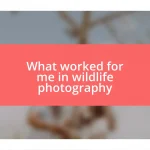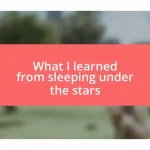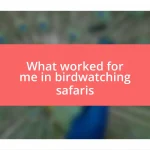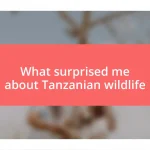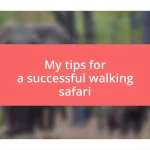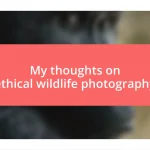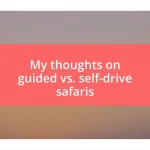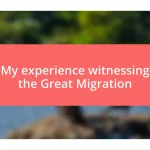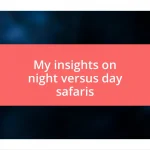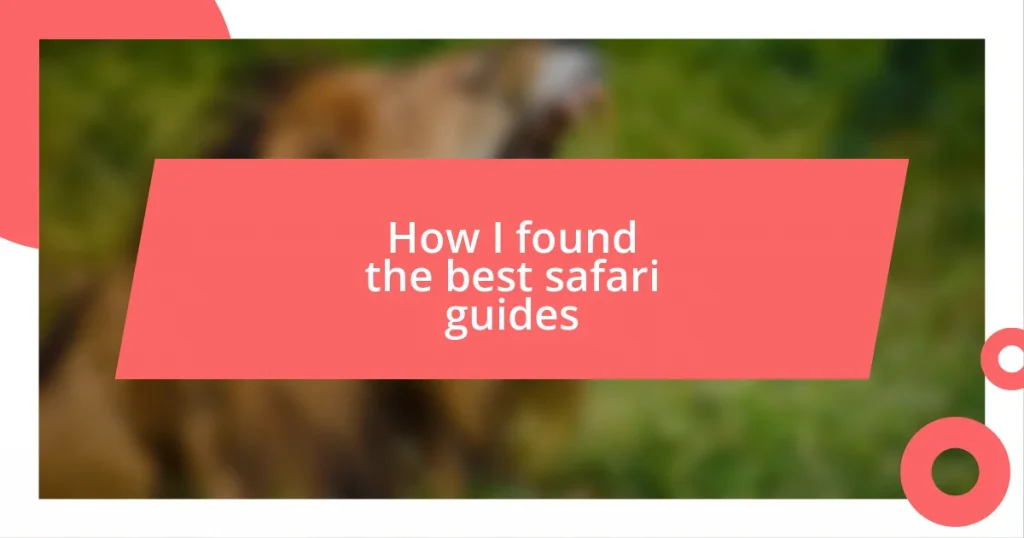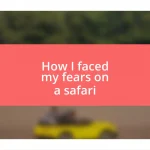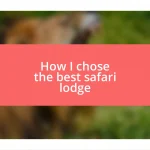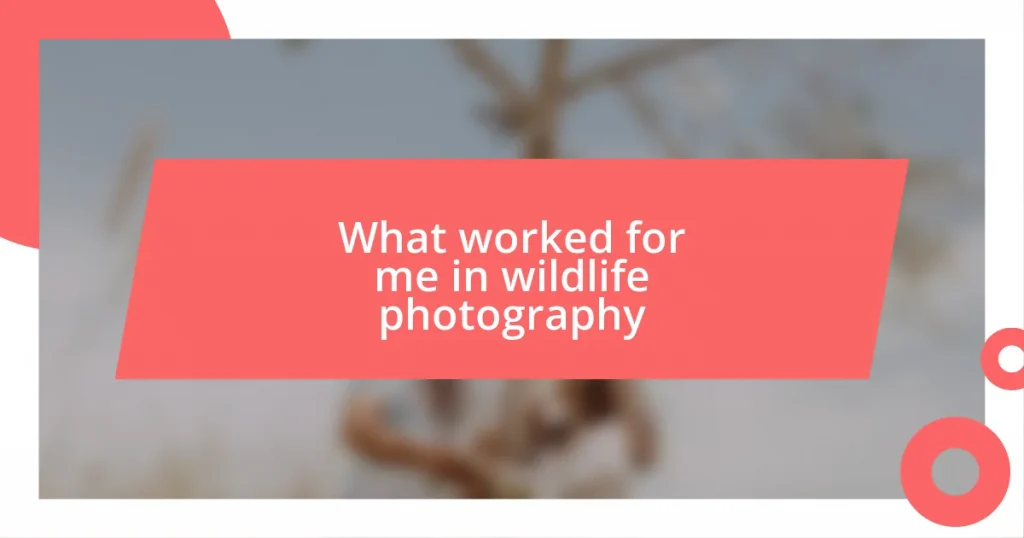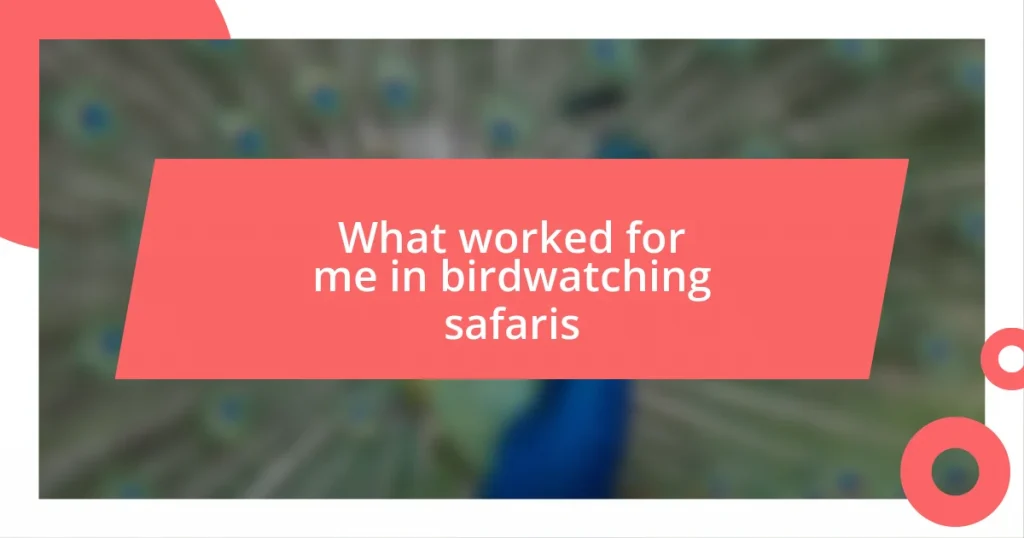Key takeaways:
- Safari guides serve as educators and protectors, connecting visitors with wildlife and the ecosystem, while prioritizing safety and conservation.
- Researching guide qualifications, such as certifications, field experience, and personal recommendations, is essential for choosing the right guide.
- Reading client reviews and evaluating guides’ storytelling abilities can provide valuable insights into their personality and adaptability, enhancing the overall safari experience.
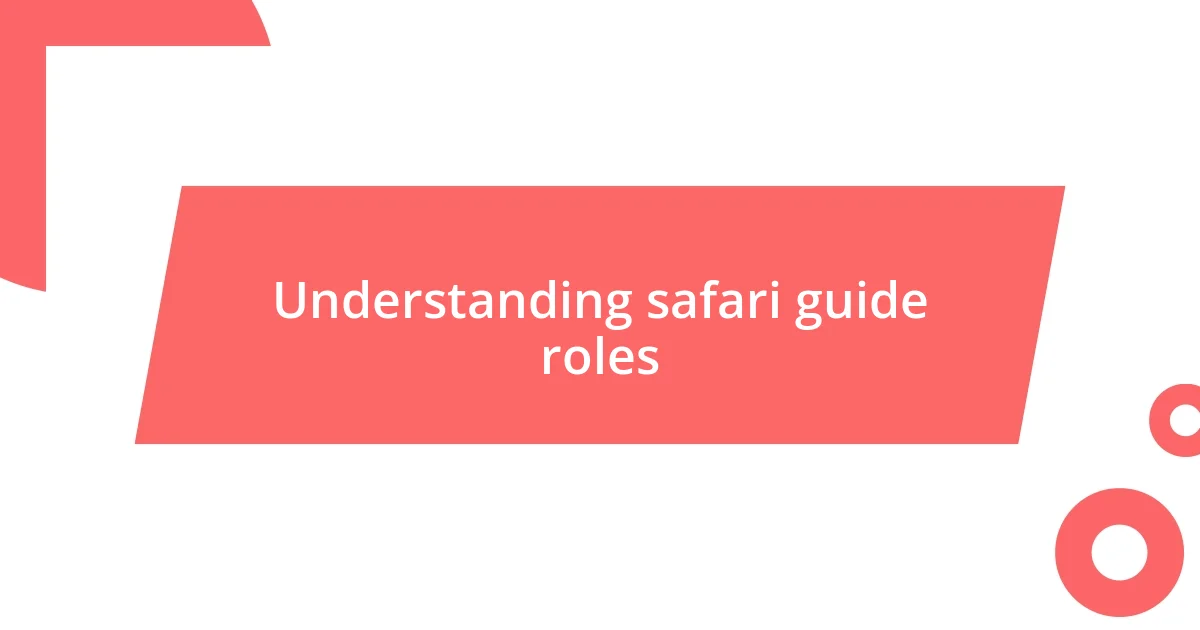
Understanding safari guide roles
Safari guides play a multifaceted role that goes beyond simply showing wildlife. They are educators, storytellers, and protectors, deeply connected to the ecosystems they navigate. I remember my first safari; the guide’s passion was palpable as he shared stories about the animals, making each sighting feel personal and special.
In my experience, a good guide acts as a bridge between the visitors and the environment. They interpret animal behavior, explain the delicate balance of the ecosystem, and often share local customs and myths that enrich the experience. Have you ever felt that moment when something suddenly clicks while listening to a passionate guide? It transforms the trip into a deeply enriching journey.
Guides also carry a significant responsibility for safety and conservation. I once witnessed a guide calmly handle a tense situation when an elephant crossed our path, illustrating just how pivotal their expertise can be. Their instinct and knowledge not only protect the guests but also ensure minimal disruption to wildlife. It makes you realize just how essential they are in preserving the magic of the safari experience.
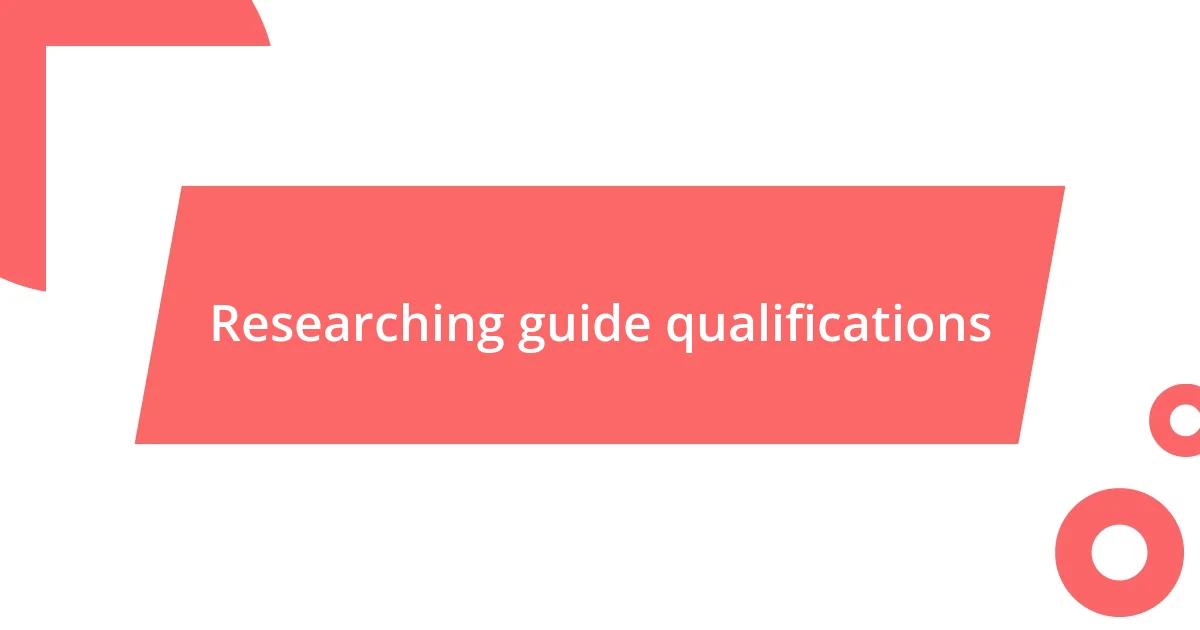
Researching guide qualifications
Researching the qualifications of safari guides is crucial for a rewarding experience. I found that many guides possess certifications from recognized organizations, which signify a level of expertise in wildlife knowledge and safety protocols. For example, some may have wildlife conservation degrees or attend specialized training programs. Knowing these qualifications beforehand can help narrow down the list to those who are not just passionate about wildlife but also professionally equipped to lead a safari.
As I delved deeper into my research, I discovered the importance of field experience. A guide with several years in the bush often possesses invaluable knowledge about the habitats and behaviors of animals. I remember a guide who spoke fondly of his encounters over the years. He shared unique stories and insights, like how a particular pride of lions adapted to seasonal changes. That blend of formal training and real-world experience truly enriches the safari experience.
I also realized that personal recommendations carry a lot of weight. When friends or travel forums speak highly of a guide, it indicates trust and a proven track record. During my travels, I often rely on word-of-mouth endorsements to find guides who not only know their subject matter but are also engaging storytellers.
| Qualification | Description |
|---|---|
| Certification | Formal training from recognized wildlife organizations. |
| Field Experience | Years spent guiding in various ecosystems. |
| Personal Recommendations | Endorsements from past clients or travel communities. |
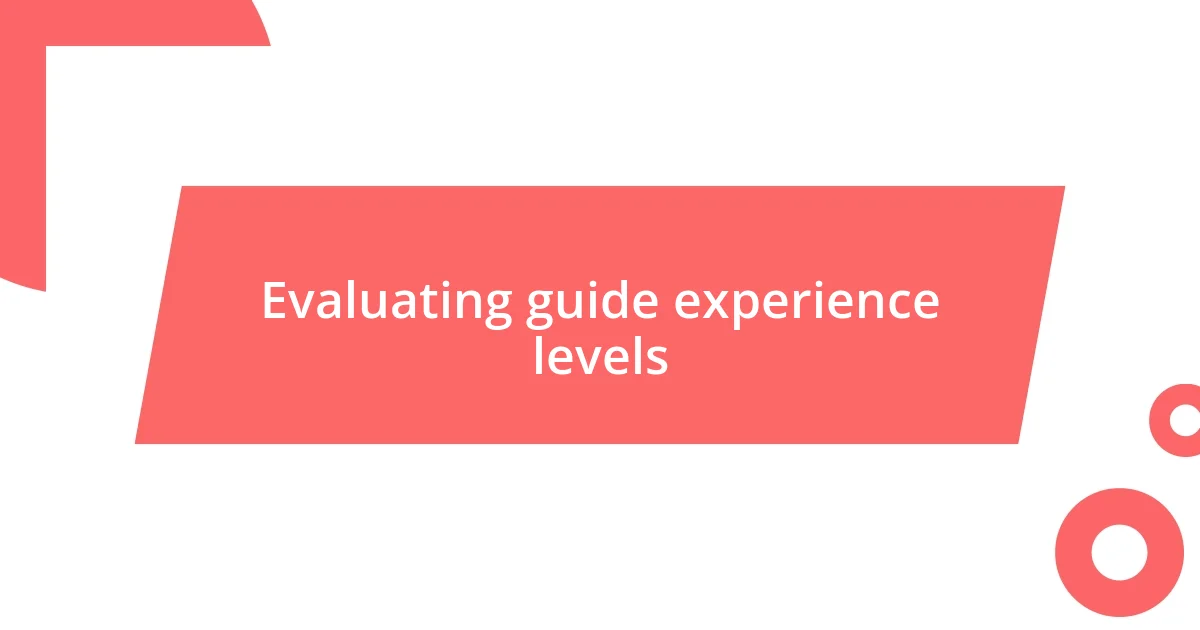
Evaluating guide experience levels
Evaluating the experience levels of safari guides is essential for ensuring an exceptional journey. I’ve learned from my own adventures that experienced guides possess a unique ability to read both their environment and their guests. For instance, there was a moment on my last safari when our guide quickly picked up on our excitement as we spotted a rare bird. His enthusiasm was infectious, and I felt more connected to the experience because he understood exactly what we needed at that moment.
Here are some key aspects to consider when evaluating a guide’s experience:
- Years of Experience: A seasoned guide typically has a wealth of knowledge accumulated over years in the field, which enhances the overall experience.
- Diversity of Environments: Guides who have worked in different ecosystems can share broader perspectives and adapt to various wildlife behaviors.
- Specialized Knowledge: Some guides focus on certain aspects, like birdwatching or botany, which can deepen your understanding of specific interests.
- Cultural Insights: Those with extensive experience often share local traditions and stories, enriching the safari beyond just wildlife sightings.
In my travels, I’ve encountered guides with varying levels of experience, and I must say, the depth of knowledge a seasoned guide offers can elevate your encounter with nature. I remember one guide who, despite his jovial demeanor, had a deep respect for wildlife, which showed during our close-up moments with a herd of elephants. It was his respectful approach that made the experience feel safe and awe-inspiring. These little moments are what make truly evaluating a guide’s experience so significant.

Reading reviews from past clients
Reading reviews from past clients reveals a treasure trove of insights. I remember the thrill of discovering glowing testimonials that painted a vivid picture of what to expect. One review described a guide who seemed to effortlessly weave together fascinating wildlife facts and engaging anecdotes, transforming a simple game drive into an unforgettable narrative that lingered long after the trip ended. Have you ever felt that spark of excitement when reading about a guide who genuinely connects with the environment? It’s a feeling I think every traveler should experience.
When I sifted through client reviews, I paid special attention to comments about the guides’ personalities. I found one review where a client mentioned how their guide went above and beyond to tailor the experience, responding to the group’s interests in birds, not just the big game. It struck me how essential it is to find a guide who genuinely listens and adapits. Isn’t that the kind of interaction that can turn a good safari into an extraordinary one?
Additionally, I discovered that not all reviews are created equal. Some clients share their experiences in detail, highlighting specific moments that resonated with them—like the guide who helped them spot a rare leopard. Others just drop a rating without explanation. It’s worth digging deeper into those narratives. As I porous through these stories, I felt reassured knowing I could find guides who not only knew where to find the wildlife but also understood the magic that lies in those fleeting moments. After all, it’s those stories that truly embody the essence of a safari, isn’t it?
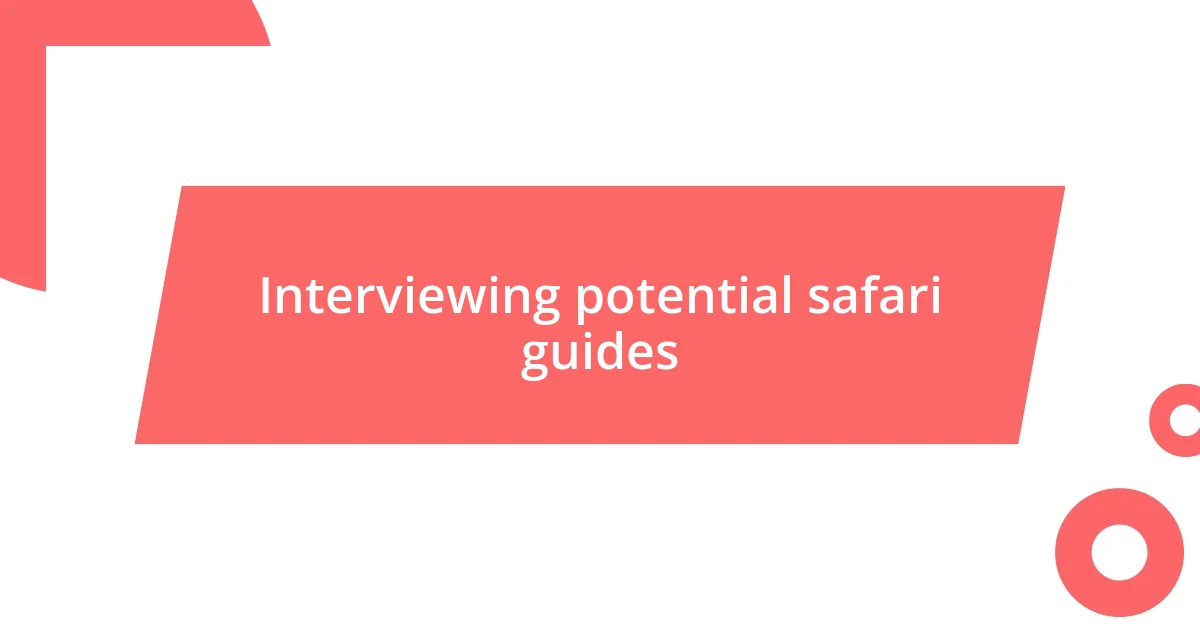
Interviewing potential safari guides
When it comes to interviewing potential safari guides, I find the experience itself can be quite revealing. I recall sitting down with one guide who, rather than simply listing his credentials, shared his passion for the African bush. His eyes sparkled as he recounted a particular encounter with a pride of lions. Can you imagine being so passionate about your work that you can transport others to those momentous experiences through your words? That’s what I aim to find in a guide—someone who not only knows the land but feels it deeply.
During the interview, I focus on their storytelling skills. A good guide doesn’t just regurgitate facts; they bring the landscape and its inhabitants to life. I once met a guide who could describe the behavior of animals in a way that sparked curiosity. He compared watching elephants to observing a family reunion; each gesture and interaction mirrored human emotions. How does that comparison resonate with you? I think it highlights the importance of finding someone who can connect the dots between nature and storytelling.
Lastly, I always ask about flexibility in their approach. A memorable guide I interviewed noted how he loves adapting his plans based on the group’s interests. For instance, he would pivot from a big game focus to a detailed exploration of the insects when he detected curiosity. It’s this kind of responsiveness that makes a safari truly personalized. Have you ever experienced a guide who changed course based on your enthusiasm? Those moments make the adventure feel like it was crafted just for you, don’t you think?
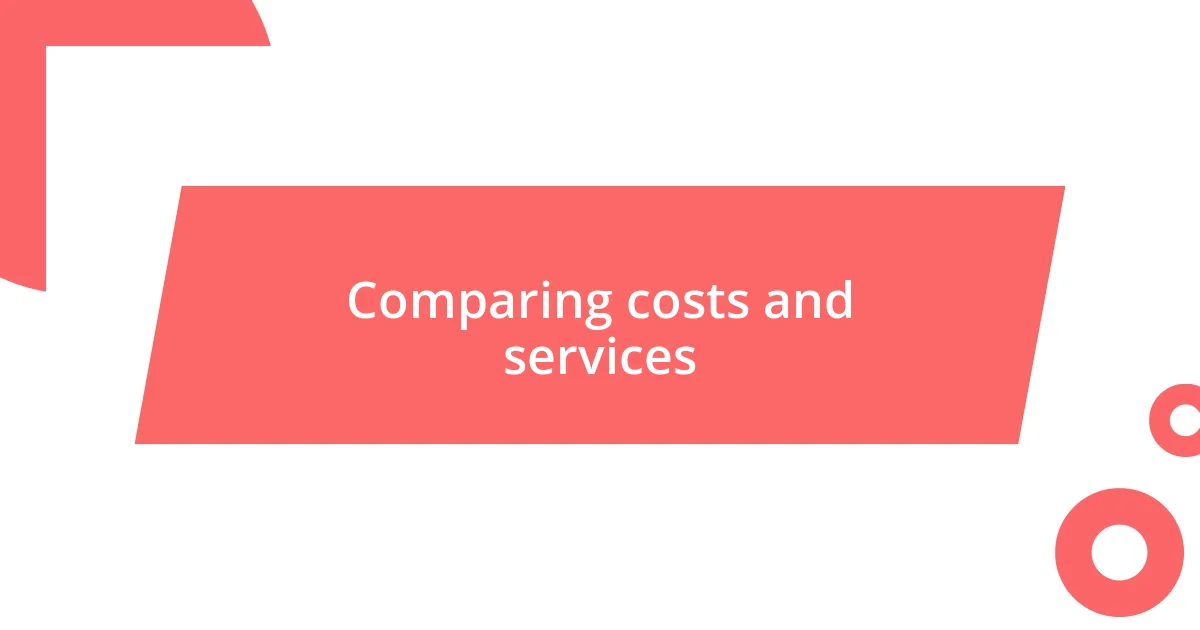
Comparing costs and services
When it comes to comparing costs, I quickly realized that price doesn’t always tell the whole story. Early in my search, I encountered a guide offering what seemed like a bargain; however, their lack of inclusivity in terms of meals and transport raised a red flag. I often wonder, how can we truly assess value if we only focus on the upfront costs? It reinforced my belief that a deeper dive into what services are actually provided is vital.
On the other hand, I stumbled across an option that was pricier but included everything from luxury accommodations to personalized wildlife tracking tours. I remember initially flinching at the price, but when I calculated the overall value, it became apparent that the experience would be worth it. I can’t help but ask, isn’t it sometimes the higher investment that leads to those once-in-a-lifetime moments we so desperately seek?
One particularly eye-opening experience for me was when I reached out to different companies. I found that discussing my safari expectations gave me a clearer idea of what various guides offered. Some simply listed their services, while others took the time to personalize their pitches based on my interests. In that moment, I understood that when guides invest their time in understanding my desires, it reflects how they might lead the safari itself. Have you thought about how a guide’s willingness to invest in the client could enhance the entire experience? It truly made me appreciate the multifaceted nature of comparing costs and services.

Making the final decision
After weighing my options, I reached a point where I had to make a choice. I remember sitting in my favorite coffee shop, scrolling through my notes and reflecting on my interactions. The guide who truly stood out was the one who made me feel a genuine connection, not just a transactional engagement. It made me ponder: how important is that emotional tie when embarking on such a journey? In the end, I realized that trust played a pivotal role in my decision.
Then, there was the moment I considered the reviews. While some feedback is just noise, the passionate testimonials often carried more weight. I once came across a review where a traveler described how their guide taught them about tracking animals, transforming a regular safari into a learning adventure. I found myself thinking, wouldn’t it be amazing to come back from the trip with knowledge, not just photos? That’s when I knew this guide had to be my choice.
Ultimately, making the final decision felt like piecing together a beautiful puzzle. Each guide had strengths and weaknesses, but looking beyond the obvious made it clear. It wasn’t just about the safari experience—it was about the journey of discovery. Have you ever found yourself in the same situation, where the decision felt more significant than the adventure itself? That’s exactly where I landed, feeling confident I’d chosen a guide who would enrich every moment in the wild.
